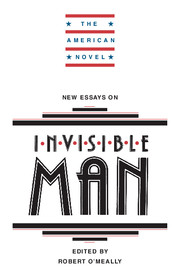Book contents
- Frontmatter
- Contents
- Series Editor's Preface
- 1 Introduction
- 2 The Meaning of Narration in Invisible Man
- 3 Frequencies of Eloquence: The Performance and Composition of Invisible Man
- 4 Ralph Waldo Ellison: Anthropology, Modernism, and Jazz
- 5 Ellison's Masks and the Novel of Reality
- 6 The Conscious Hero and the Rites of Man: Ellison's War
- Notes on Contributors
- Selected Bibliography
4 - Ralph Waldo Ellison: Anthropology, Modernism, and Jazz
Published online by Cambridge University Press: 05 June 2012
- Frontmatter
- Contents
- Series Editor's Preface
- 1 Introduction
- 2 The Meaning of Narration in Invisible Man
- 3 Frequencies of Eloquence: The Performance and Composition of Invisible Man
- 4 Ralph Waldo Ellison: Anthropology, Modernism, and Jazz
- 5 Ellison's Masks and the Novel of Reality
- 6 The Conscious Hero and the Rites of Man: Ellison's War
- Notes on Contributors
- Selected Bibliography
Summary
Though a highly conscious artist who is eloquent about the meaning of his art, Ralph Waldo Ellison is, in his own words, not a systematic thinker, certainly not one with a blueprint or program. Least of all does he believe in radical Utopias or pious certainties. And his work shows a healthy distrust of simple answers. Hence, any attempt to chart a map of his thinking about American literature and culture is doomed to a measure of failure. For he belongs, like his protagonist in Invisible Man, to the tradition of American tinkerers, and he is, like his namesake Ralph Waldo Emerson, a manipulator of words – the French would call him a bricoleur of language.
And yet, the cumulative evidence of his stories, his essays, his novel, and his carefully choreographed interviews, all of which will be treated here as one universe of discourse, allows us to identify certain recurrent strategies of thinking, typical scenarios and interactions, arguments, and scripts. If we were to divide aesthetic paradigms and their attendant world views into those based on being and those based on becoming, Ellison would favor the latter and would therfore opt for ritual, open-endedness, latency, ambivalence, and antistructure. His meanings are therefore temporary and transient, or, to use his own word, experimental. His answers are of the yes-but sort, shot through with disclaimers and contradictions that mirror, condense, and clarify (but rarely resolve) the political and social ambiguities of black American existence in the New World.
- Type
- Chapter
- Information
- New Essays on Invisible Man , pp. 95 - 122Publisher: Cambridge University PressPrint publication year: 1988
- 3
- Cited by



